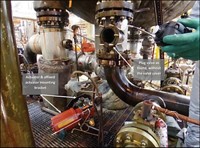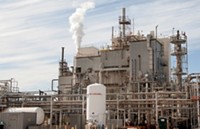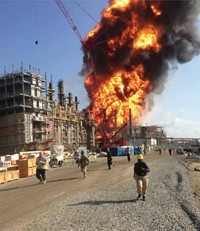Advertisement
Grab your lab coat. Let's get started
Welcome!
Welcome!
Create an account below to get 6 C&EN articles per month, receive newsletters and more - all free.
It seems this is your first time logging in online. Please enter the following information to continue.
As an ACS member you automatically get access to this site. All we need is few more details to create your reading experience.
Not you? Sign in with a different account.
Not you? Sign in with a different account.
ERROR 1
ERROR 1
ERROR 2
ERROR 2
ERROR 2
ERROR 2
ERROR 2
Password and Confirm password must match.
If you have an ACS member number, please enter it here so we can link this account to your membership. (optional)
ERROR 2
ACS values your privacy. By submitting your information, you are gaining access to C&EN and subscribing to our weekly newsletter. We use the information you provide to make your reading experience better, and we will never sell your data to third party members.
Safety
Fatal Accident At DuPont Probed
Investigation: Chemical Safety Board calls for inherently safer design review
by Jeff Johnson
October 1, 2015
| A version of this story appeared in
Volume 93, Issue 39

A cascade of process errors and inadequate safeguards led to the deaths of four workers at a DuPont insecticide plant in La Porte, Texas, says an interim accident report by the Chemical Safety & Hazard Investigation Board (CSB). The board released that report and a related safety video on Sept. 30.
“DuPont has long been regarded as a safety leader in the chemical industry,” CSB Chair Vanessa Allen Sutherland says, “but this investigation has uncovered weaknesses or failures in DuPont’s safety planning and procedures.”
The interim report is intended to guide DuPont as it restarts the product line that made Lannate, an insecticide, from methyl mercaptan. The Nov. 15, 2014, accident released 24,000 lb of the highly toxic and flammable raw material.
First among CSB recommendations is that DuPont conduct an inherently safer design review for its processes using toxic chemicals. DuPont has carried out such reviews in the past, CSB notes, but not for methyl mercaptan or chlorine, which are used at La Porte.
The accident followed a series of mistakes, which began days earlier with the inadvertent introduction of water into a methyl mercaptan storage tank. The water, methyl mercaptan, and cold temperatures combined to form a hydrate that blocked the tank’s feed line.
Workers warmed pipes to break up the hydrate. They opened and closed valves and vents to redirect the methyl mercaptan while they worked to reduce the hydrate. Eventually operators succeeded, and the piped material began to flow.
Meanwhile, in another part of the production line, two workers began a routine mission to drain a vent in a poorly ventilated manufacturing building. The vent piping contained methyl mercaptan because of a jerry-rigged configuration to reduce the hydrate. The toxic chemical was released and vaporized, exposing the unprepared workers.
The stricken workers immediately called for help. Two others, brothers, responded. All four died.
CSB investigator Dan Tillema says that after initial hesitation, DuPont agreed to comply with recommended changes before restarting the process. DuPont did not respond to C&EN’s requests for comment.





Join the conversation
Contact the reporter
Submit a Letter to the Editor for publication
Engage with us on Twitter